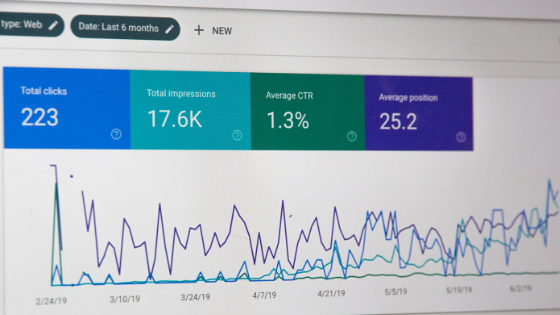Continue reading "5 Tips to Get Your Website on Google Search’s First Page "
Did you know that 75% of people don’t visit the second page and beyond on a Google Search?
So, if ranking on the first page of Google Search of your business’ keyword is not in your strategy, you’ve been missing out. Ranking on the first page of a search on your business’ keywords is crucial to get the clicks and the organic traffic you need. Otherwise, you risk losing potential customers to your competition. With the right SEO strategy, you can drive the organic inbound traffic necessary for business growth.
The higher you rank on search results, the more chance you have to get your target audience to find your website.
So here are 5 tips to increase your chances of ranking on the first page of Google Search:
1. Choose the right keyword
The most important step to rank higher on organic search is to identify the keywords you want to rank for. The relevancy of the keywords to your brand and products are key elements of an effective SEO strategy. Focusing on long-tail keywords can also be a good strategy as they are easier to rank for and the majority of searches are made through using them. Since by using long-tail keywords you can provide more information to the users that are likely to look for specific information. By providing an answer to their question, you’ll have a higher chance of converting them into buying customers.
2. Monitor the Competition
You should also be looking at which keywords your competitor is targeting as it will give you an idea about what your target audience is looking for. Make sure to identify your top competitors and conduct thorough research on their website content using keyword research tools. Also, you can beat your competition by providing higher quality and a lot more content. By including more informative in-depth content and providing answers to your target audience you’ll increase the chance of being found and rank higher.
3. High-Quality Content
The role of Google is to show the most relevant and useful results to its users. For Google to find your content useful, you’ll need to cover all the topics that users are expecting to see. Search engine rankings are affected immensely by the quality of the content. Writing blog posts that focus on your product and services will be key for users to find your website when the search intent occurs. Also including your target keywords in these blog posts will help Google’s algorithm to favor your pages as it will see them as an authority resource. However, keyword stuffing may cause getting penalized or banned from the results altogether.
4. Have More Backlinks & Internal Links
There is a positive correlation between organic search traffic and backlinks which has been proved multiple times. A page’s authority can be boosted by backlinks it has and the higher the authority of a page, the more it will be shown in the results. Along with having backlinks, adding internal relevant links in your pages is also an effective way to boost a page’s authority. Both of these actions give out a sign for Google to perceive it as an authority and reward a page with a higher ranking. But it’s also important to note here that promoting your content across multiple channels will provide more links to your pages.
5. Have an Outstanding User Experience
If your website is not easy to navigate and takes too long to load, it won’t matter how high-quality content you publish to rank higher on search results. As Google wants to provide the best search experience for its users, it won’t show a web page that has been marked as slow loading or has a high bounce-rate score. You need to make sure your website is user-friendly and works fast across all devices to provide the best user experience. If a user finds it hard to navigate between your pages they will spend less time on your website which will negatively affect your bounce rate and dwell time.
Despite all your efforts to rank higher on search results, you may not see an improvement right away because it takes time for the Google algorithm to monitor user behavior on your website.
And there is no definite answer or specific formula that is known to work 100% so just make sure you are creating the right content and investing in SEO, you’ll eventually see improvement on your website’s traffic.
If you need help with your SEO strategy to rank on the first page of Google Search Results contact us today.
About the Author
The Best Digital Marketing Insight and Advice
The WSI Digital Marketing Blog is your go-to-place to get tips, tricks and best practices on all things digital
marketing related. Check out our latest posts.
We are committed to protecting your privacy. For more info, please review our Privacy and Cookie Policies. You may unsubscribe at any time.
Don't stop the learning now!
The AI Marketing Revolution: Why 2025 Is Your Strategic Turning Point
Summary: Although 86% of SEO professionals have already embraced AI integration, many marketers still regard artificial intelligence as optional. In 2025, this approach is no longer sustainable. A sophisticated AI marketing strategy distinguishes market leaders from their competitors. Discover how to transform AI from industry concept into your most powerful growth catalyst, fostering authentic customer relationships …
Continue reading “The AI Marketing Revolution: Why 2025 Is Your Strategic Turning Point”
READ MOREAI Leadership: Why C-Suite Executives Must Drive the AI Transformation
Introduction AI is no longer just a technology initiative—it’s a strategic business enabler. Yet, many executives still perceive AI as a technical issue and delegate it solely to IT teams. This mindset is a critical mistake. AI is a leadership issue, and its successful integration depends on C-suite oversight. As Hande Ocak Basev puts it, …
Continue reading “AI Leadership: Why C-Suite Executives Must Drive the AI Transformation”
READ MOREBeyond the Hype: Why Generative AI is Just One Piece of the Puzzle
In recent years, Generative AI (GenAI) has rapidly transformed how businesses and individuals interact with technology, capturing the imagination of many. Its ability to create content—from text and images to music—makes it seem like the cutting edge of AI. However, focusing solely on GenAI can lead organizations to overlook the broader AI technologies that offer …
Continue reading “Beyond the Hype: Why Generative AI is Just One Piece of the Puzzle”
READ MORE





